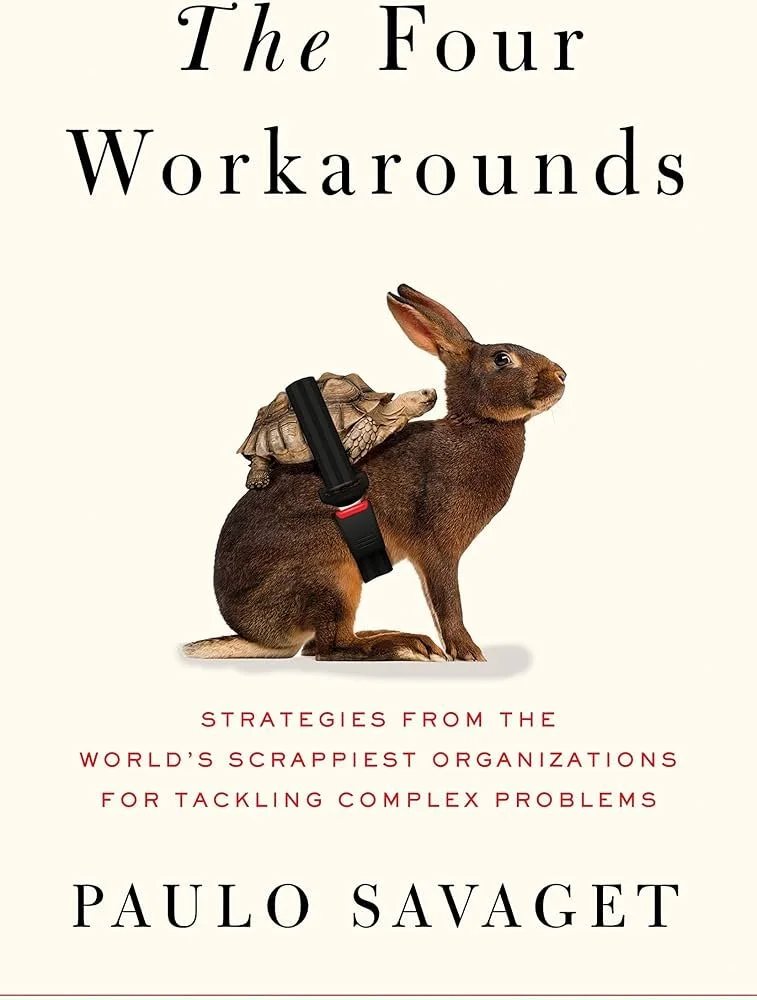Book of the Month - February 2025
The Four Workarounds
Paulo Savaget - ISBN: 978-1250827081 - 2024
Author:
PAULO SAVAGET
Paulo Savaget, author of The Four Workarounds, is associate professor at Oxford University’s Engineering Sciences Department and the Saïd Business School. He holds a PhD from the University of Cambridge as a Gates Scholar and has a background working as a lecturer, consultant, entrepreneur, and researcher finding innovative solutions for a more inclusive world. As a consultant, he worked on projects for large companies, non-profits, and government agencies in Latin America, and the OECD. He currently resides in Oxford.
Brief Synopsis:
We constantly encounter complex problems at home, in our places of work, and in society at large. Even if we had all the time and money in the world, sometimes no good solution can be found. So, what should we do, especially when we can’t wait? The answer: a workaround.
For ages, global corporations have been lecturing small organizations and not-for-profits on how to get things done. As it turns out, it should have been the other way around. In this groundbreaking book, award-winning researcher Paulo Savaget shows how the most valuable lessons about problem-solving can be learned from the scrappiest groups.
Savaget draws most of his examples from small organizations dedicated to social action that have made an art form out of subverting the status quo and have proved themselves adept at achieving massive wins with minimal resources. Through his research, Savaget identified the four workarounds that these groups commonly employ: the piggyback, the loophole, the roundabout, and the next best. With vivid and fascinating examples from his life and travels, he demonstrates how each one works and how to know which one to use when.
The Four Workarounds shows how seemingly intractable problems―from public urination to the challenges of delivering lifesaving medicine to remote communities―were addressed using unconventional tactics. Some of the world’s biggest and most admired companies are already using Savaget’s research to transform the ways they do business. And these same lessons can also revolutionize the ways we approach the challenges we all encounter every day of our lives.
Insights:
“I didn’t plan to study workarounds; I bumped into them as I searched for resourceful ways to tackle complex problems.” - pg. 1
“I then pivoted my research to explore how change makers—entrepreneurs, academics, companies, nonprofits, community groups, and even policymakers—work around obstacles, both on-and off-line, to “hack” all sorts of problems, ranging from global responses to some of the world’s toughest challenges, such as global pandemics, gender inequality, and poverty, to everyday inconveniences. This pivot took me to unexpected places, where I had the privilege of learning from scrappy organizations that don’t get the widespread credit they deserve.”- pg.4-5
“Workarounds are attainable, lower-risk options for deviance and can produce potentionally outsized payoffs. Just because work-arounds require less effort than negotiation and confrontation doesn’t make them less valuable. After all, there is no shame in enjoying low-hanging fruit.” - pg. 174
“Each of the workarounds has a primary element at play. When you think about piggybacks, consider the existing relationships in your situation. Loopholes require paying close attention to different sets of rules. Roundabouts involve examing behaviors that lead to inertia. And if you’re searching for next-best approaches, fiddle with the resources you have on hand. Not every situation is going to necessitate using each of these four workarounds, and that’s okay. In the end, you really need only one workaround for most challenges.” - pg. 204-205
Should I read it or skip it?
The Four Workarounds by Paulo Savaget is a refreshing and engaging look at problem-solving through unconventional means. Drawing on real-world examples from around the globe, Savaget introduces four types of “workarounds” used by resourceful individuals and organizations to navigate complex challenges without relying on traditional, often rigid systems. His storytelling is vivid and accessible, making abstract concepts tangible and actionable. Rather than glorifying shortcuts, Savaget highlights creative, ethical approaches that prioritize impact over bureaucracy.
What makes the book stand out is its empowering message: effective solutions don’t always require massive resources or perfect conditions—they require agility, insight, and boldness. Savaget’s framework invites readers to rethink their assumptions about innovation and embrace a mindset of flexibility. Whether you’re a leader in business, a policymaker, or someone tackling everyday obstacles, The Four Workarounds offers a compelling toolkit for making meaningful change when the usual paths are blocked.
I really enjoyed this book. Some of us think outside the box to create new pathways. Often, I am afraid of being accused of cheating. This book puts words to my constant need to analyze where I can find more efficient and smarter ways to accomplish the mission—especially in ministry settings where time, money, and people are always in short supply. As a church administrator, I’m constantly juggling competing demands, and The Four Workarounds affirmed that innovation doesn’t require a full budget or ideal conditions. Sometimes the most faithful stewardship is found in creative problem-solving that bends the process without breaking the purpose.

